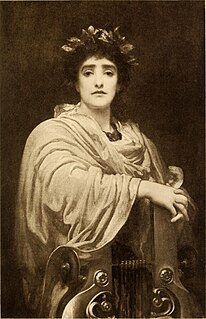 W
WAesop was a Greek fabulist and storyteller credited with a number of fables now collectively known as Aesop's Fables. Although his existence remains unclear and no writings by him survive, numerous tales credited to him were gathered across the centuries and in many languages in a storytelling tradition that continues to this day. Many of the tales are characterized by animals and inanimate objects that speak, solve problems, and generally have human characteristics.
 W
WCorinna or Korinna was an ancient Greek lyric poet from Tanagra in Boeotia, described by Herbert Weir Smyth as the most famous ancient Greek woman poet after Sappho. Although ancient testimonia portray her as a contemporary of Pindar, not all modern scholars accept the accuracy of this tradition, and some claim that she is more likely to have lived in the Hellenistic period of 323 to 31 BC. Her works, which survive only in fragments, focus on local Boeotian legends. Her poetry is of interest as the work of one of the few preserved female poets from ancient Greece.
 W
WEzekiel is the central protagonist of the Book of Ezekiel in the Hebrew Bible.
 W
WHaggai was a Hebrew prophet during the building of the Second Temple in Jerusalem, and one of the twelve minor prophets in the Hebrew Bible and the author of the Book of Haggai. He is known for his prophecy in 520 BCE, commanding the Jews to rebuild the Temple. His name means "my holidays." He was the first of three post-exile prophets from the Neo-Babylonian Exile of the House of Judah, who belonged to the period of Jewish history which began after the return from captivity in Babylon.
 W
WJeremiah, also called the "weeping prophet", was one of the major prophets of the Hebrew Bible. According to Jewish tradition, Jeremiah authored the Book of Jeremiah, the Books of Kings and the Book of Lamentations, with the assistance and under the editorship of Baruch ben Neriah, his scribe and disciple.
 W
WPāṇini was an ancient Sanskrit philologist, grammarian, and a revered scholar in ancient India.
 W
WSun Tzu was a Chinese general, military strategist, writer and philosopher who lived in the Eastern Zhou period of ancient China. Sun Tzu is traditionally credited as the author of The Art of War, an influential work of military strategy that has affected both Western and East Asian philosophy and military thinking. His works focus much more on alternatives to battle, such as stratagem, delay, the use of spies and alternatives to war itself, the making and keeping of alliances, the uses of deceit and a willingness to submit, at least temporarily, to more powerful foes. Sun Tzu is revered in Chinese and East Asian culture as a legendary historical and military figure. His birth name was Sun Wu and he was known outside of his family by his courtesy name Changqing. The name Sun Tzu by which he is best known in the Western World is an honorific which means "Master Sun".